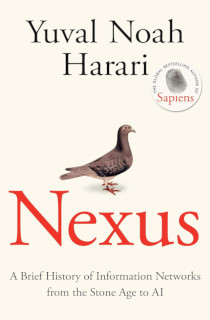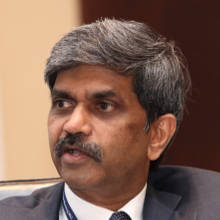Nexus: A Brief History of Information Networks from the Stone Age to AI
By Yuval Noah Harari

Buy on Amazon
Insights from Yuval Noah Harari’s book ‘Nexus: A Brief History of Information Networks from the Stone Age to AI’
D ShivakumarBy Yuval Noah Harari

Buy on Amazon
Yuval Noah Harari is an Israeli historian, philosopher and a global bestselling author. His books have sold more than 45 million copies in 65 languages.
He co-founded Sapienship, an international social impact company with his husband Itzik Yahav. Harari is a PhD from Oxford.
Why are we good at accumulating more information and power, but far less successful at acquiring wisdom?
In our mental model, information leads to truth which splits into wisdom and power.
The populist view is that information is power.
This book does not argue that studying the past will help us predict the future. As emphasised repeatedly, history is not deterministic, and the future will be shaped by the choices we all make in the coming years.
Information is increasingly seen as the most basic building block of reality, more elementary than matter and energy.
Defining something as information is a matter of perspective.
The naive view information as an attempt to represent reality. It is aware that some information does not represent reality.
Viewing information as a social nexus helps us understand many aspects of human behaviour that confound the naive view of information as representation.
Information sometimes represents reality and sometimes does not, but it always connects.
When we see the rise of information from the stone age, we see a constant rise in volume of information without the concomitant rise in truthfulness or wisdom.
We sapiens rule the world, not because we are intelligent but because we are the only species that can cooperate flexibly in large numbers.
Chimps and ants do cooperate but not at this scale.
The two levels of reality that preceded story telling are objective reality and subjective reality.
Objective reality is about things—stones, buildings, asteroids, etc. and subjective reality is about pain, pleasure, love.
There is a third level of reality and that’s intersubjective reality—like gods, nations, corporations, etc.
All relationships between large-scale human groups are shaped by stories and the identities of these groups are defined by stories.
The centrality of stories reveals something fundamental about the power of our species and explains why power does not go hand in hand with wisdom.
In history, power stems only from partially knowing the truth.
Information is about truth and order. Truth splits as wisdom and power and order leads to power.
Human information is a tightrope of balancing truth with order.
Stories were the first crucial information developed by humans.
Information led to lists.
Lists and stories are complimentary
Lists are more boring than stories; it means that we find it difficult to remember lists but we remember stories.
Lists of properties, taxes, and payments created a bureaucracy and administrative systems.
Mythology and bureaucracy are the twin pillars of every large-scale society.
Documents, archives, forms etc. have changed the way information flows in society and with it the way power works.
For better or for worse, literate bureaucracies tended to strengthen the central authority at the expense of ordinary citizens.
The difficulty of understanding bureaucratic power made it harder for the masses to influence it.
In bureaucratic societies, the lives of ordinary people are often upended by unidentified officials of an unfathomable agency for incomprehensible reasons.
The holy book became an important religious technology in the first millennium BCE.
Who decides what to include in the holy book was a big question.
Anticipating blockchain by 2000 years, Jews began making numerous copies of the holy code and every Jewish community was supposed to have at least one in its synagogue.
As Jews argued about the interpretation of the holy book, the rabbis gained more power and prestige.
With each iteration, the power of the rabbinical institution increased.
When Christians talk of the Bible, they mean the Old Testament plus the New Testament.
While churches made decisions about texts, the texts themselves shaped the churches.
Without the printing press, it would have been difficult for Copernicus, Galileo and their colleagues to develop and spread their ideas.
For truth to win, it is important to develop curation institutions that tilt the balance in favour of facts.
In scientific research, you publish or perish. You challenge the status quo, unlike priests with the religious books.
Dictatorial systems are based on being highly centralized and the assumption that the centre is infallible.
The most common way for strongmen to undermine democracy is to attack its self-correcting mechanisms.
A democracy provides two things—human rights and civil rights.
Populism offers strongmen an ideological basis for making themselves dictators while pretending to be democrats.
Democracies die when people are unwilling to talk and also when people are not able to listen.
Newspapers played a crucial role in the formation of early modern democracies.
New technologies like the telegraph, telephone, radio and train and the airplane supercharged the power of mass media.
Mass media made previously marginalised groups organise public conversations and helped make political demands.
This sadly led to violence when things were not seen to be heard.
Authoritarian regimes like the USSR didn’t allow free speech, so USSR got their own PC by the time USA already had 11 million PCs.
In the early days USSR used PCs for streamlining production but all the data in paper form had to be sent to Moscow.
The rise of intelligent machines that can make decisions and create new ideas means that for the first time in history, power is shifting away from humans.
The Rohingya case in Myanmar where Facebook algorithms kept pushing the wrong material is an example. Facebook algorithms were making decisions by themselves; this didn’t happen with the printing press or radio sets.
The Facebook algorithm can have a goal to make people spend more time on Facebook. The algorithm can then decide to spread the wrong information which it sees is generating engagement.
The ability of computers to pursue their own goals changes the fundamental nature of our information network.
As computers amass power, it is likely that a completely new information network will emerge. This will create new political and personal realities.
We get information from the tech giants and we pay them with information. This shifts the economy from money to information.
A person or company with little money in the bank but with a wealth of information will get powerful.
States have thousands of years of experience in taxing money, they have little experience in taxing information.
Human beings are used to being monitored. When this monitoring helps provide social services then it’s acceptable; when it crosses the privacy line, it’s dangerous.
For example, you don’t want your health situation to be revealed to your employer or your insurance company, who might then dismiss you or ask you to pay a higher premium.
Facial recognition systems are used routinely all over the world.
The Denmark soccer club Brendby IF began to use facial recognition to identify and ban football hooligans.
After Iran became an Islamic theocracy in 1979, women had to wear a hijab and cover their head. Today facial recognition helps the authorities to fine and punish women who do not do so either in public or while driving their cars.
A growing section of employees and truck drivers are being put through surveillance.
Ranking is a common theme of a social media society. Everyone is ranking everyone else. This in the future will have impact on your employability and everything else.
One big difference between money and reputation is that money has tended to be a mathematical construct based on precise calculation but reputation is not.
Social media algorithms see us simply as an attention mine. The algorithms reduce a range of human emotions—hate, love, joy, confusion—into a single catch-all category: Engagement.
In a completely free information fight, truth tends to lose.
Social media platforms singularly lack in self-correcting mechanisms.
Social media has been helpful in connecting people, giving voice to previously disfranchised people, and has unleashed a wave of human creativity.
Computers are mathematical beings that don’t have a psychology or mythology.
IBM algorithms could identify white men from pictures correctly but were wrong 34.7% of the time when it came to identifying women of colour.
Algorithms feed on their own biases. In screening job applications many algorithms didn’t shortlist any women from women’s universities since the sample size previously was small.
Computers do not have the ability to say “I don’t know”.
How can democracies survive and flourish in a digital age?
Automation will destabilize the job market. No one knows what skills are needed for the future. For e.g., it is easier to automate chess than dishwashing. It is easier to replace a doctor through automation than a nurse.
It is far easier for a robot to conduct a wedding ceremony than it is for it to drive a car.
The future of employment will be very volatile, newer jobs will be created and they could vanish faster too.
The most important human skill for surviving the 21st century is likely to be flexibility.
The nature of the new information economy might make the imbalance between imperial hub and exploited colony worse than ever.
Land was paramount in the Agri era, then machine became paramount and more important than land. Today information is more important. Amazon was the largest apparel retailer in USA in 2021.
Forging and keeping international agreements on AI will require major changes in the way the international system functions.
By Yuval Noah Harari

Buy on Amazon
Was this article useful? Sign up for our daily newsletter below
About the author

Shivakumar is Operating Partner at Advent International. Before this, he was President (Corporate Strategy and Business Development) at Aditya Birla Group. Earlier assignments include: Chairman & CEO at Pepsico India and prior to that, Managing Director at Nokia India. Before joining Nokia, he worked with consumer electronics maker Philips and top consumer goods firm Hindustan Unilever. He is an engineer from IIT Chennai and an MBA from IIM Calcutta.
Shivakumar has written three books: Reflections - a collection of Shivs articles; The Right Choice - Resolving Ten Career Dilemmas; and The Art of Management. The latter two are business bestsellers.
Also by me
Trending